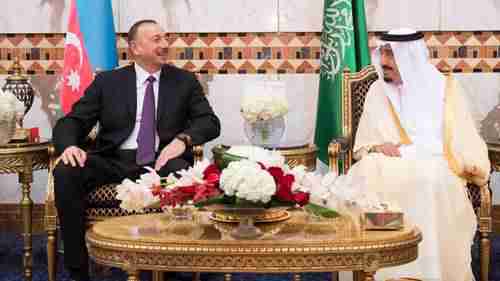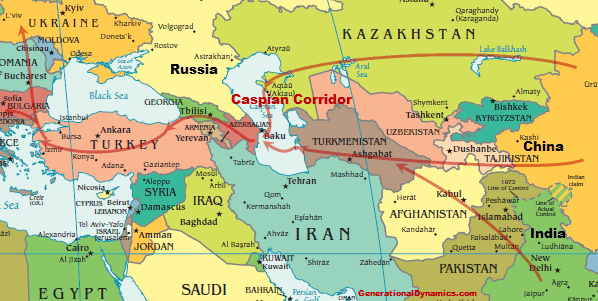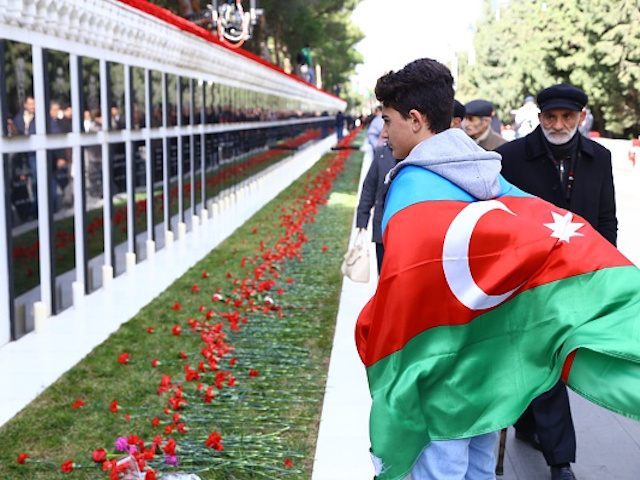This morning’s key headlines from GenerationalDynamics.com
- Azerbaijan forced to choose between Russia and Turkey
- Azerbaijan becomes the hub of the Caspian Trade Corridor, part of the new Silk Road
Azerbaijan forced to choose between Russia and Turkey

Azerbaijan’s President Ilham Aliyev and Saudi King Salman Bin Abdulaziz Al Saud
Within the past couple of months, two major fault lines have developed and widened in Eurasia: Russia versus Turkey and Iran versus Saudi Arabia. These developments have forced a number of countries in the region (and beyond) to make choices between two sides where this had not been necessary before. We have written articles on the mediation issues facing Tajikistan and Pakistan and various Sunni countries and the United States.
In addition, there is the two-year-old growing Russia versus Ukraine fault line.
Azerbaijan is thickly involved in all of these major fault lines because of its strategic location and because its interdependencies:
- Azerbaijanis are ethnically Turkic, and the country has very close relations with Turkey.
- About one-quarter to one-third of the Iranian population are ethnic Azerbaijanis.
- There are two million Azerbaijanis living in Russia, either as citizens or as guest workers.
- The Azerbaijani and Turkish languages are close, and mutually comprehensible. The Azerbaijanis in Iran and Russia speak an Azerbaijani dialect, though it is discouraged in Iran.
Azerbaijan is officially neutral in the dispute between Turkey and Russia, but Azerbaijan has two major flash points with Russia.
First, Azerbaijan has military treaties with Turkey. Azerbaijani and Turkish Armed Forces regularly conduct joint military exercises, and two are planned in 2016.
Second, Azerbaijanis living in Russia are pressuring the Russian government to abandon plans to pass a law making it illegal for any individual to deny that Turkey committed genocide against the Armenians in 1915. Armenia is an enemy of both Turkey and Azerbaijan. 30 leaders of Azerbaijani organizations in Russia, apparently organized by Azerbaijan’s government, demanded that that the law be withdrawn, pointing out that the Russian government had refused to acknowledge that the Hojali massacres in 1992 were a “genocide” of Azerbaijanis by Armenian forces. One Russian official called the demand a “stab in the back,” because it threatened to “challenge the law in the courts of international human rights.”
People who think we are still living in the 1990s are expecting everyone to come to their senses, and for all of these fault lines to dissolve, so that things can return to “normal” again. But this is a generational Crisis era, when fault lines widen rather than dissolve. It probably will not be long before a new fault line between Russia and Azerbaijan develops, and they start imposing sanctions on each other. APA (Azerbeijan) and Rubin Center (Israel) and Jamestown and Regnum.ru (12-Dec – Trans)
Azerbaijan becomes the hub of the Caspian Trade Corridor, part of the new Silk Road

The Caspian Trade Corridor is part of the New Silk Road connecting Asia with Europe
In ancient times the Silk Road, a complex road network, was the most favored transport route between China and Europe. In recent centuries it lost its importance because of new developments in maritime technologies which led to cheaper and higher-volume seaborne trade.
But with the fall of the Soviet Union in 1991, and the rise of China in world trade, there has been interest in a “New Silk Road” for about 20 years.
With all the fault lines widening and sanctions being imposed in Eurasia, a number of trade routes between Asia and Europe have been closed, the New Silk Road concept has become more urgent, and this has presented a kind of opportunity to Azerbaijan to become the hub of a new collection of trade routes known as the “Caspian Trade Corridor.”
China and Ukraine are important trading partners, and if China wants to ship goods to Ukraine, they can try shipping through the India Ocean and risk meeting pirates, or they can ship overland through Iran or Russia, and risk being stopped by sanctions.
Even more important, 40% of the world’s exported oil passes through the Persian Gulf and the Strait of Hormuz. Some 50,000 ships go through the Strait each year, making it a major choke point in international trade. Even a brief blockage would have major negative effects on the international energy markets.
For these reasons, the concept of a “Caspian Trade Corridor” has been discussed internationally for almost twenty years, but now with tensions growing throughout Eurasia, the discussions are becoming more urgent, to provide alternate trading routes.
The plan is to develop infrastructure within the Caspian Sea to effectively connect Central Asia to the Caucasus region. Goods can travel overland from India and China through Central Asia by truck and railway, to a port on the Caspian Sea. From there, the goods are ferried across the Caspian Sea to a port in Azerbaijan. From there, they can travel overland again, through Georgia, Turkey, and then into Europe, including Ukraine.
Turkey expects to benefit greatly from the Caspian Corridor. Turkish trucks that used to travel overland through Georgia, Russia and Kazakhstan are now being blocked from entering Russia. However, Turkey has yet to complete 76 kilometers of a railway that will connect Turkey, Georgia and Azerbaijan. It’s now considered urgent to complete this railway line as quickly as possible.
Azerbaijan’s Port of Baku is converting Baku into a logistic hub. Kazakhstan and Turkmenistan are building high capacity ports on the Caspian Sea, and are investing in marine transport vessels.
Turkish officials expect the Caspian Corridor through Azerbaijan and the Caspian Sea to actually be cheaper than existing routes, and to give Turkey the opportunity to open new markets in Central Asia and China. Jamestown and Euro Dialog (2014) and Daily Sabah (Istanbul) and Haldun Yavas (Istanbul, 9-Dec-2015)
KEYS: Generational Dynamics, Azerbaijan, Iran, Russia, Turkey, Caspian Trade Corridor, New Silk Road, Kazakhstan, Turkmenistan, Iran, Strait of Hormuz, Persian Gulf, Georgia, Armenian genocide, Hojali massacres
Permanent web link to this article
Receive daily World View columns by e-mail

COMMENTS
Please let us know if you're having issues with commenting.